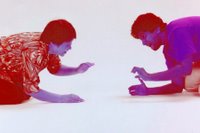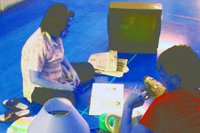 After a Saturday playing cleaning lady for J's ampulets studio while he played IT technician trying to overcome some ridiculous Mac/Intel/Adobe bug, we visited the mentally and physically exhausted Ma J at the hospital before rushing to catch Theatre Practice's re-staging of the late Kuo Pao Kun's play Mama Looking for her Cat.
After a Saturday playing cleaning lady for J's ampulets studio while he played IT technician trying to overcome some ridiculous Mac/Intel/Adobe bug, we visited the mentally and physically exhausted Ma J at the hospital before rushing to catch Theatre Practice's re-staging of the late Kuo Pao Kun's play Mama Looking for her Cat.Mama Looking for Her Cat was first staged in 1988. It is often referred to as the first multilingual play in Singapore. From watching a short clip of that original staging screened as part of Saturday's new staging, how I wished I was in the 1988 audience!
 In the 1988 staging, Sasitharan (current director at the Theatre Training and Research Programme ), played an old Indian man Mama bumped into while searching for her cat. It turns out both of them are in a similar predicament, having had their cats "chased out" by their children. Though not speaking each other's language, they gestured and "meowed" their way into an understanding. In the bare black box setting, their physical distance across the length of the stage gradually was closed (on all fours, they moved) until Mama laid an understanding hand on the old man's shoulder - resolving a very well-acted comic exchange.
In the 1988 staging, Sasitharan (current director at the Theatre Training and Research Programme ), played an old Indian man Mama bumped into while searching for her cat. It turns out both of them are in a similar predicament, having had their cats "chased out" by their children. Though not speaking each other's language, they gestured and "meowed" their way into an understanding. In the bare black box setting, their physical distance across the length of the stage gradually was closed (on all fours, they moved) until Mama laid an understanding hand on the old man's shoulder - resolving a very well-acted comic exchange. Kuo Pao Kun was attuned to the fractures of Singapore culture and history. These are breaks and disjunctures the island's people and leaders have intended or had to contend with. There are the cultural break-ups with the languages, traditions and heritage of each migrant community. These accentuate generational breaks, familial tensions. There is also the fractured relationship between people and authority, as well as the break between the island's post-65 history and everything else before. In Mama/Cat, the physical absence of a cat, Mama's loneliness, the children's busy-ness, the multiple languages and the use of nursery rhymes/games - through both extremes of absence and profusion - dramatise the fractures between generations and cultures. Yet those same strategies of rhymes/games and multilingualism offer the possibility of reconciliation.
Kuo Pao Kun was attuned to the fractures of Singapore culture and history. These are breaks and disjunctures the island's people and leaders have intended or had to contend with. There are the cultural break-ups with the languages, traditions and heritage of each migrant community. These accentuate generational breaks, familial tensions. There is also the fractured relationship between people and authority, as well as the break between the island's post-65 history and everything else before. In Mama/Cat, the physical absence of a cat, Mama's loneliness, the children's busy-ness, the multiple languages and the use of nursery rhymes/games - through both extremes of absence and profusion - dramatise the fractures between generations and cultures. Yet those same strategies of rhymes/games and multilingualism offer the possibility of reconciliation. In this way Kuo Pao Kun was larger than this small island.
Watching last Saturday's staging adapted by Singaporean cast and Austrian director Martina Winkel, there were moments of simple brilliance. The multiple languages and multiple media, when simply used, worked. The simulcast with Austria, including a moving telling of a migrant Turkish family's experience of dislocation in Austria, sounded on paper a tad fussy. But it added to the performance brief stretches of emotional and narrative simplicity and silence (ah, paradox) amidst the theatre studio's noisy dramatics.
 And what a noisy 1.5hrs - visually, aurally and "poetically"! The set by artist Brian Gothang Tan (with its suspended screens and multiple TVs showing a live feed of the play), the soundtrack (audience could bring music to be mixed by a DJ), the "guest appearance" by Sasitharan (who sat typing his stream-of-consciousness laments on language and national identity onto the screen) and the actors' performance... noise noise noise.
And what a noisy 1.5hrs - visually, aurally and "poetically"! The set by artist Brian Gothang Tan (with its suspended screens and multiple TVs showing a live feed of the play), the soundtrack (audience could bring music to be mixed by a DJ), the "guest appearance" by Sasitharan (who sat typing his stream-of-consciousness laments on language and national identity onto the screen) and the actors' performance... noise noise noise. Perhaps this staging wanted to drive home the point that in 2006, the communication barriers we face are not mitigated but built by the many more channels of information and translation.
Perhaps Sasi wanted, through his palimpsest, to make obvious the analogy between the impatience of Mama's children with our wilful insistence on being cultural orphans - our disregard for the langauge of our national anthem, our national amnesia...etc etc.
Perhaps it was just a long day. So I walked out of the studio a little tired by the noise and lamenting. It was quite opposite to reading Kuo Pao Kun's script and watching that short clip of his 1988 staging where theatre itself - its process and the possibilities of engagement between work/audience/actors - seem to be able to present possibilities, not quite of healing, but at least of learning.
-----------
Some other links on the play here:
> Malaysian arts website Kakiseni
> NLB's Infopedia page
> Ng Yi Sheng's Review at the Flying Inkpot






No comments:
Post a Comment